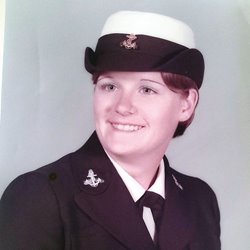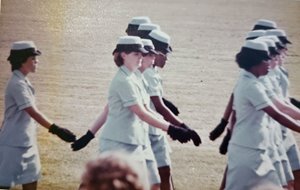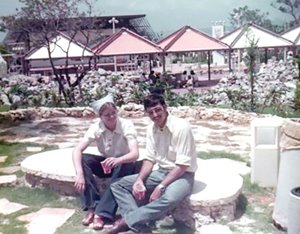Each year on March 29, Vietnam veterans are recognized on National Vietnam War Veterans Day.
It is a time to pay special tribute to the 9 million Americans who served during the Vietnam War era, to the 58,000 names memorialized on the Vietnam Veterans Memorial in Washington, D.C., and to those who never received the recognition they deserved when they returned to America from war.
March 29, 1973, is the day U.S. Military Assistance Command, Vietnam was disestablished, and the day the last U.S. combat troops departed Vietnam. In addition, on and around this same day, the U.S. Vietnam War Commemoration stated that Hanoi released the last of its acknowledged prisoners of war.
Source: Legion.org
Vietnam Era veteran reflects on her service during America’s tumultuous war
American Legion Auxiliary and American Legion member Pat Jarvis joined the military in 1973. At the time, she wasn’t quite sure what she wanted to do … but wanted something different for her life.
 Jarvis had to talk to her parents first.
Jarvis had to talk to her parents first.
“I don’t want you to get mad at me, but I think I want to go into the service,” she recalled telling her mom and dad. “Mom got excited and said, ‘I always wanted to do that, but I was so scared’ and Dad said, ‘Don’t go in the Army.’”
Jarvis’ father was an Army veteran and didn’t want his daughter serving in that branch because of things he had witnessed regarding women in the service.
After going to the Air Force office first, Jarvis ended up at the Navy office.
“He was a super recruiter,” she said. “I did the same test [as the Air Force] and he said, ‘If you want to go in, you can just about take anything you want.’”
Jarvis remembers being curious about what it would be like. She asked the recruiter, but at the time, men and women were still separated while serving so he couldn’t really provide an answer. In the service, they were not allowed to talk to one another. They shared a chow hall, but men were on one side and women on the other, and the classes were separated too.
 Jarvis recalls arriving at 1 a.m. to bootcamp and had to go into the barracks quietly, trying not to wake anyone up.
Jarvis recalls arriving at 1 a.m. to bootcamp and had to go into the barracks quietly, trying not to wake anyone up.
“I laid down on the top bunk, looked at the ceiling, and thought, What have I done?” she said. “It didn’t make me cry; I wasn’t crying to go back home or anything.”
In the military, Jarvis was in communications and went to school to become a radioman. Learning to type was the first part of the class, but Jarvis was already skilled in that area. When she was in ninth grade, she moved to Thailand because of her father’s military career, and she learned to type to help her brother and sister in summer school.
“I ended up going into a different class — I typed too great,” she said. “I got to work in the office where all the teachers were doing administrative stuff.”
Jarvis also didn’t type on regular typewriters — all of their work was done on Western Union teletypes.
“Every place we would send a message, we had to have the first line perfect or it wouldn’t get there and it would be rejected,” she recalled. “It had to be absolutely, exactly right.”
During the Vietnam War, Jarvis spent 18 months in Okinawa, Japan, at her first duty station. She was in communications. While there, she saw a lot of classified documents go through and had to have top secret clearance.
“Every once in a while, we got something we had to turn around and send out to others,” she said. “A lot of that was coming out of Vietnam.”
 She said she enjoyed serving her country, especially seeing places around the world beyond her hometown.
She said she enjoyed serving her country, especially seeing places around the world beyond her hometown.
“Okinawa is not a terrible place — there are some very beautiful areas of it,” she said. “We rented a car and went driving around.”
Jarvis served in the Navy from 1973-1977. She comes from a military family — her father served in the Army for 30 years during World War II, Korea, and Vietnam, and her husband served for 32 years in the Navy.
Some of our country’s Vietnam War veterans went through a lot when they returned home — heckled, spit on, yelled at. The list goes on.
“This is something that blows my mind away, especially after World War I and World War II heroes,” Jarvis said of the way some Vietnam veterans were treated.
She recalls her brother-in-law seeing signs in Norfolk, Va., that read, ‘Sailors and dogs stay off the grass.’ Additionally, her mother would get calls saying her dad had been killed while serving in Vietnam.
“I remember getting up to get a drink at night and seeing a light on and my mother would be sitting on the front porch waiting to see if someone came to tell her the news,” she said.
Jarvis was lucky and didn’t have the negative experiences some servicemembers had upon arriving home from the war.
“Overall, it was a very, very positive experience,” she said. “It was my honor to do it.”
Jarvis wants others to know that Vietnam/Vietnam Era veterans “did their job just like any other veteran did,” she said. “They followed orders and did what they were told just like everybody else did.”
In the spirit of Service, Not Self, the mission of the American Legion Auxiliary is to support The American Legion and to honor the sacrifice of those who serve by enhancing the lives of our veterans, military, and their families, both at home and abroad. For God and Country, we advocate for veterans, educate our citizens, mentor youth, and promote patriotism, good citizenship, peace and security.